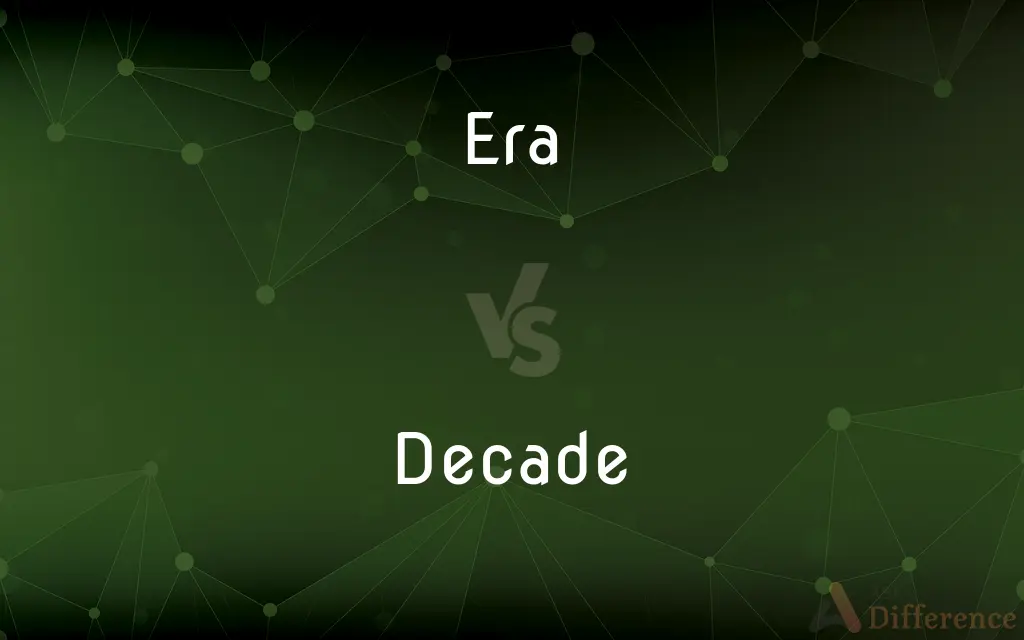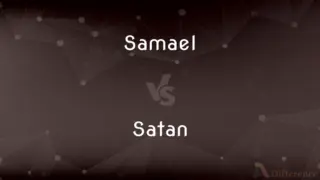Era vs. Decade — What's the Difference?
Edited by Tayyaba Rehman — By Urooj Arif — Updated on April 8, 2024
An era spans a significant, distinct period marked by particular characteristics, events, or figures; a decade is a 10-year span, often used to measure time in historical and cultural contexts.

Difference Between Era and Decade
Table of Contents
ADVERTISEMENT
Key Differences
An era is characterized by significant events, changes, or figures that mark its beginning and end, making it a term that encompasses periods of variable length. These can be as short as a few years or as long as centuries, defined by historical, cultural, or geological milestones. On the other hand, a decade specifically refers to a ten-year period, often used to categorize and understand historical and cultural developments within a more manageable timeframe.
While eras are defined by their impact on civilization or significant geological changes, signifying profound transformations or the dominance of specific phenomena, decades are more uniform in duration. This uniformity makes decades particularly useful for comparing changes over shorter, more consistent periods, whereas eras provide a broader overview of transformative epochs.
Eras often carry thematic or qualitative significance, encapsulating the essence of a period's identity or major shifts in human activity. For instance, the Renaissance era reflects a rebirth of arts and sciences, spanning several centuries. In contrast, decades, like the 1960s or 1980s, might be identified by distinctive cultural trends, fashion, music, or political movements, but their significance is anchored in their chronological placement within a century.
The naming conventions of eras vary widely, sometimes reflecting geopolitical changes, such as the Victorian Era, named after Queen Victoria, which highlights the period's distinct cultural and political climate. Meanwhile, decades are commonly referred to by their ordinal number within a century, such as the "twenties" for the years 1920 to 1929, simplifying their identification within the timeline of history.
Understanding the context of an era versus a decade is crucial for historical analysis. Eras offer insights into the broader, often more profound, shifts in society, technology, or geology, providing a lens through which to view the development of civilizations or the Earth itself. Decades, however, offer a more granular view of history, allowing for detailed examination of societal evolution, trends, and events within a clearly defined temporal boundary.
ADVERTISEMENT
Comparison Chart
Duration
Variable, can span years to centuries
Fixed, 10 years
Definition Basis
Significant events, changes, or figures
Chronological, every 10 years
Usage
Historical, cultural, geological periods
Historical, cultural contexts
Naming Convention
Often thematic or named after key figures
Numbered within a century
Significance
Reflects profound transformations
Marks shorter, specific trends
Compare with Definitions
Era
A historical period identified by some prominent figure or characteristic.
The Elizabethan era is named after Queen Elizabeth I of England.
Decade
A way to measure time in personal or historical contexts.
She celebrated a decade of work at the company.
Era
A phase in a person's life or in history with significant influence or importance.
Moving to a new city marked a new era in her life.
Decade
A division of time used in history to categorize events.
The first decade of the 21st century introduced social media.
Era
A division of time characterized by radical changes or developments.
The Jurassic era is well known for its dinosaurs.
Decade
A term often associated with specific cultural or fashion trends.
The 80s are known for vibrant fashion and the rise of pop music.
Era
A span in geological time.
The Mesozoic era included the Triassic, Jurassic, and Cretaceous periods.
Decade
A tool for historians to organize and compare periods of time.
The seventh decade of the 20th century is often remembered for the space race.
Era
A significant period marked by distinctive character, events, or circumstances.
The digital era revolutionized communication globally.
Decade
A decade is a period of 10 years. The word is derived (via French and Latin) from the Ancient Greek: δεκάς, romanized: dekas, which means a group of ten.
Era
An era is a span of time defined for the purposes of chronology or historiography, as in the regnal eras in the history of a given monarchy, a calendar era used for a given calendar, or the geological eras defined for the history of Earth. Comparable terms are epoch, age, period, saeculum, aeon (Greek aion) and Sanskrit yuga.
Decade
A period of ten years.
Era
A period of time as reckoned from a specific date serving as the basis of its chronological system.
Decade
A group or series of ten.
Era
A period of time characterized by particular circumstances, events, or personages
The Colonial era of US history.
The Reagan era.
Decade
A group, set, or series of ten , particularly:
A decade of soldiers
Era
The longest division of geologic time, made up of one or more periods.
Decade
A period of ten years , particularly such a period beginning with a year ending in 0 and ending with a year ending in 9.
The 1960s was a turbulent decade.
I haven’t seen my cousin in over a decade!
Era
A time period of indeterminate length, generally more than one year.
Decade
A period of ten days, (history) particularly those in the ancient Egyptian, Coptic, and French Revolutionary calendars.
Era
(geology) A geochronologic unit of tens to hundreds of millions of years; a subdivision of an eon, and subdivided into periods.
Decade
A work in ten parts or books, particularly such divisions of Livy's History of Rome.
Era
A fixed point of time, usually an epoch, from which a series of years is reckoned.
The foundation of Solomon's temple is conjectured by Ideler to have been an era.
Decade
(Roman Catholicism) A series of prayers counted on a rosary, typically consisting of an Our Father, followed by ten Hail Marys, and concluding with a Glory Be and sometimes the Fatima Prayer.
Era
A period of time reckoned from some particular date or epoch; a succession of years dating from some important event; as, the era of Alexander; the era of Christ, or the Christian era (see under Christian).
The first century of our era.
Decade
Any of the sets of ten sequential braille characters with predictable patterns.
Era
A period of time in which a new order of things prevails; a signal stage of history; an epoch.
Painting may truly be said to have opened the new era of culture.
Decade
(electronics) A set of ten electronic devices used to represent digits.
Era
A period marked by distinctive character or reckoned from a fixed point or event
Decade
(electronics) A set of resistors, capacitors, etc. connected so as to provide even increments between one and ten times a base electrical resistance.
Era
A major division of geological time; an era is usually divided into two or more periods
Decade
The interval between any two quantities having a ratio of 10 to 1.
There are decades between 1.8 and 18, between 25 and 250 and between 0.03 and 0.003.
Decade
A group or division of ten; esp., a period of ten years; a decennium; as, a decade of years or days; a decade of soldiers; the second decade of Livy.
During this notable decade of years.
Decade
A period of 10 years
Decade
The cardinal number that is the sum of nine and one; the base of the decimal system
Common Curiosities
Are decades always ten years long?
Yes, by definition, a decade always comprises exactly ten years.
Can an era span multiple decades?
Yes, an era can span multiple decades or even centuries, depending on its defining characteristics and impact.
What is an era?
An era refers to a significant period marked by distinctive characteristics, events, or figures, spanning from years to centuries.
How is a decade defined?
A decade is defined as a period of ten years, often used to categorize and understand historical and cultural developments.
How do historians determine the beginning and end of an era?
Historians determine the boundaries of an era based on significant shifts in culture, technology, politics, or geology.
What is the difference between an era and an age?
An era is broader and can encompass multiple ages, which are sub-periods within an era characterized by specific developments or events.
How do decades influence popular culture?
Decades often influence popular culture by encapsulating the fashion, music, and social attitudes prevalent during the time.
Why are decades important in historical studies?
Decades are important for providing a manageable timeframe to study trends, events, and changes in society.
Do eras overlap with centuries?
Eras can overlap with centuries, as they are not strictly defined by time but by significant historical or cultural shifts.
Do all cultures use the same era classifications?
Cultural perceptions of eras can vary, with different societies marking eras according to their own historical milestones.
How do eras get their names?
Eras are often named after significant figures, events, or the dominant characteristics of the period.
What makes an era significant?
An era gains significance from transformative events or developments that have a lasting impact on civilization or the planet.
Is the concept of a decade used globally?
Yes, the concept of a decade is used globally as a universal measure of time.
Can a single historical event define an era?
Yes, a single significant event can define an era if it has a profound and lasting impact.
Can the length of an era be precisely measured?
The length of an era varies and is not as precisely measurable as a decade since it's based on significant transitions rather than strict time intervals.
Share Your Discovery

Previous Comparison
Chat vs. Chatter
Next Comparison
Samael vs. SatanAuthor Spotlight
Written by
Urooj ArifUrooj is a skilled content writer at Ask Difference, known for her exceptional ability to simplify complex topics into engaging and informative content. With a passion for research and a flair for clear, concise writing, she consistently delivers articles that resonate with our diverse audience.
Edited by
Tayyaba RehmanTayyaba Rehman is a distinguished writer, currently serving as a primary contributor to askdifference.com. As a researcher in semantics and etymology, Tayyaba's passion for the complexity of languages and their distinctions has found a perfect home on the platform. Tayyaba delves into the intricacies of language, distinguishing between commonly confused words and phrases, thereby providing clarity for readers worldwide.














































